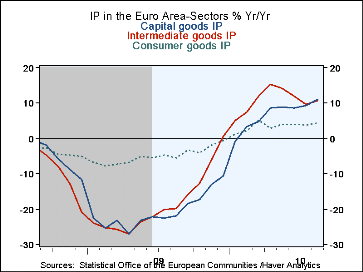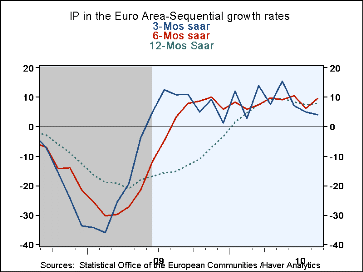 Global| Oct 13 2010
Global| Oct 13 2010IP Jumps In The Zone But It's Not Going Through Hoops
Summary
Euro-Area IP jumped in August. The 0.9% rise in MFG output follows a slide of 0.3% and drop of 0.2%. Those are the fist consecutive drops in IP for the Zone Since April of 2009. Through thick and through thin in this recovery one fact [...]
 Euro-Area IP jumped in August. The 0.9% rise in MFG output follows a slide of 0.3% and drop of 0.2%.
Those are the fist consecutive drops in IP for the Zone Since April of 2009. Through thick and through thin
in this recovery one fact remains and that is that, consumer goods - both demand for them and supply of them – continues to lag.
Euro-Area IP jumped in August. The 0.9% rise in MFG output follows a slide of 0.3% and drop of 0.2%.
Those are the fist consecutive drops in IP for the Zone Since April of 2009. Through thick and through thin
in this recovery one fact remains and that is that, consumer goods - both demand for them and supply of them – continues to lag.
Despite a robust monthly rise in IP, growth in the zone is fading. Capital goods output is still climbing higher Yr/yr but consumer output growth is steady at a weak level and intermediate goods output has slowed sharply.
Sequential growth rates (second chart) look at the progression in annualized growth from one-year to six-months to three-months. Each of these growth rates shows slowing when compared to its own history. Moreover, three-month growth, which is the cutting edge, is posting a weaker growth rate than for the other measures indicating that growth is slowing down despite this month's burst of activity.
The sequential growth chart also provides a good look at the volatility in the three-month growth rate but also shows that it has broken out of its seesaw pattern to slow further this month despite the sharp one month rise in IP. A part of that is a 'base effect.' The fact that three-months ago IP rose sharply blunts the impact this month sharp rise on three-month growth. The comparison with that gain diminishes the impact of this month's rise on the overall three-month growth rate. Still, the slowing in IP is not simply technical. The trends are all pretty clear on this point and that dove tails all-too-well with the fundamentals as we know them.
 Despite this slowdown
we have Axel Weber of the Bundesbank asking that the period of special securities purchases by the ECB come to an end. Germany, of course,
in the strongest European economy and it is keeping its austerity-strapped economy afloat by feasting on foreign demand with its export
growth. Other European countries are not so lucky and continue to face economic challenges. The Weber policy request is as if from
outer-space it is so out of touch and out of sync with euro-reality. Hard money is one thing but you don't have to purposely drop it
on your toe and create and injury with it.
Despite this slowdown
we have Axel Weber of the Bundesbank asking that the period of special securities purchases by the ECB come to an end. Germany, of course,
in the strongest European economy and it is keeping its austerity-strapped economy afloat by feasting on foreign demand with its export
growth. Other European countries are not so lucky and continue to face economic challenges. The Weber policy request is as if from
outer-space it is so out of touch and out of sync with euro-reality. Hard money is one thing but you don't have to purposely drop it
on your toe and create and injury with it.
Europe continues to have a bifurcated economy. The ECB is hard-pressed to make a policy that is right for everyone. It hardly seems that there is any overheating in the Zone and it certainly feels like the air of distress is still all-around. Ireland just announced a big bank support package barely a week ago. It is not clear to me why Weber is so eager to put everyone's feet back to the fire. Burn them and they will not be able to carry their own loads and that will put more stress back on Germany. Austerity is one thing but insensitivity is another and policy foolishness yet something else. His suggestion hints at the third of these.
The trends and sequential growth rates by sector confirm the notion of a slowing in the European economy and that is significant in a month with a huge output gain on the table. For the month all the large EMU nations are showing increases in IP. But France is under the stress of strike as pension reform (a form of austerity) is not going down well there. Even when things are going well they don't go well everywhere.
Europe continues to be in distress. The Germans want to pretend all is well far sooner than seems wise. There are trade disputes in gear and a currency war that seem to be on the brink of breaking out. The US approach to ending its period of weak growth seems to worry everyone except a few (brave souls?) at the Fed.
This continues to be a difficult time for world growth, for policy economics, and for free trade. That does not man that it all will end badly, but it might. Free trade comes under attack in recession when there is not enough domestic demand to go around. Instead, of solving this problem at the last Economic Summit, Germany made it worse when it prevailed with a view to engage austerity early. Germany and the UK went for this plan with both feet as did the troubled smaller European economies that were under stress and had no choice but to knuckle under to market pressures. As a result of taking that fork in the road we find ourselves here with fading growth and less momentum than we otherwise might have had. The Germans may not see it this way but one of the reasons that Mr Weber cannot have his is way now is because Chancellor Merkel had her way at this year's summit. What goes around comes around.
| Euro-Area MFG IP | ||||||||||
|---|---|---|---|---|---|---|---|---|---|---|
| Saar except M/M | Mo/Mo | Aug 10 |
Jul 10 |
Aug 10 |
Jul 10 |
Aug 10 |
Jul 10 |
|||
| Euro-Area Detail | Aug 10 |
Jul 10 |
Jun 10 |
3Mo | 3Mo | 6Mo | 6Mo | 12Mo | 12Mo | Q-2 |
| MFG | 0.9% | -0.3% | -0.2% | 1.8% | 0.8% | 6.7% | 6.2% | 8.6% | 7.7% | 1.3% |
| Consumer | 0.0% | 0.1% | 0.1% | 0.9% | 5.1% | 3.3% | 3.2% | 4.4% | 3.8% | 2.6% |
| C-Durables | 1.8% | -0.4% | -0.5% | 3.5% | 7.9% | 8.2% | 2.7% | 7.0% | 5.4% | |
| C-Non- durables | -0.2% | 0.2% | 0.2% | 1.1% | 4.6% | 3.0% | 3.4% | 4.2% | 3.5% | |
| Intermediate | 1.4% | -0.1% | -0.4% | 3.8% | 0.9% | 12.6% | 10.6% | 10.7% | 9.6% | 2.9% |
| Capital | 3.0% | 0.1% | 0.5% | 15.3% | 9.4% | 18.9% | 10.8% | 11.1% | 9.2% | 12.7% |
| Main Euro-Area Countries and UK IP in MFG | ||||||||||
| Mo/Mo | Aug 10 |
Jul 10 |
Aug 10 |
Jul 10 |
Aug 10 |
Jul 10 |
||||
| MFG Only | Aug 10 |
Jul 10 |
Jun 10 |
3Mo | 3Mo | 6Mo | 6Mo | 12Mo | 12Mo | Q:2 Date |
| Germany: | 1.8% | -0.2% | 0.0% | 6.6% | 11.9% | 20.1% | 15.3% | 12.6% | 12.5% | 8.5% |
| France: IPxConstruct'n |
0.0% | 0.8% | -1.6% | -3.4% | 1.8% | 2.4% | 2.9% | 3.2% | 5.6% | 0.5% |
| Italy | 2.0% | 0.2% | 0.6% | 11.8% | 8.0% | 11.0% | 7.3% | 10.3% | 5.7% | 10.0% |
| Spain | 6.2% | -3.0% | -1.1% | 8.2% | -8.7% | 16.2% | 6.4% | 1.2% | -0.7% | -0.3% |
| UK: EU member | 0.3% | 0.4% | 0.3% | 4.5% | 4.5% | 6.0% | 8.7% | 6.0% | 5.1% | 4.6% |
Robert Brusca
AuthorMore in Author Profile »Robert A. Brusca is Chief Economist of Fact and Opinion Economics, a consulting firm he founded in Manhattan. He has been an economist on Wall Street for over 25 years. He has visited central banking and large institutional clients in over 30 countries in his career as an economist. Mr. Brusca was a Divisional Research Chief at the Federal Reserve Bank of NY (Chief of the International Financial markets Division), a Fed Watcher at Irving Trust and Chief Economist at Nikko Securities International. He is widely quoted and appears in various media. Mr. Brusca holds an MA and Ph.D. in economics from Michigan State University and a BA in Economics from the University of Michigan. His research pursues his strong interests in non aligned policy economics as well as international economics. FAO Economics’ research targets investors to assist them in making better investment decisions in stocks, bonds and in a variety of international assets. The company does not manage money and has no conflicts in giving economic advice.
More Economy in Brief
 Global| Feb 05 2026
Global| Feb 05 2026Charts of the Week: Balanced Policy, Resilient Data and AI Narratives
by:Andrew Cates






